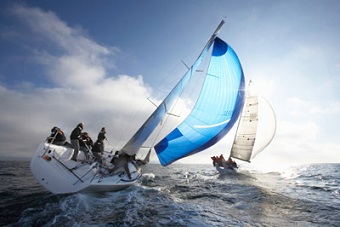The level of enjoyment experienced while sailing will depend significantly on the type of boat used, or more importantly, whether the sailor in question is capable of sailing it.
A boat where the sailor is competent and comfortable will be considerably more enjoyable to sail in than a vessel where they are unsure of all of its workings.
Essentially, the latter case should not occur, as it increases the level of risk associated with sailing.
Open water can be very dangerous and operating a boat in difficult conditions should only be attempted by someone who is fully aware of what they are doing.

When learning to sail, the basics form the starting point before gradual progression will see sailors tackle longer journeys and larger, more complicated vessels.
As a sailor progresses, they move up via classes of boat – they will develop the necessary skills and experience so that they are capable when sailing.
Day skipper courses provide all of the information that a sailor requires prior to skippering a vessel and these courses require a great deal of time and dedication.
Plenty of theory is included on these courses, so that sailors are aware of how to handle certain challenges that they may face.
Weather conditions can change very quickly so coping with these changing conditions in a manner that is safe is absolutely essential.
A number of rules and regulations limit the number of passengers that are allowed on certain vessels – especially when it comes to smaller boats.
Typically, boats that are more than 28 feet in length will not have restrictions although they will still have to adhere to government and coastguard rules.
Vessels which are less than 28 feet in length have strict limits on the number of people allowed in a boat and sailors carry a responsibility to ensure the rules are followed.
The majority of these regulations concern safety aboard a sailing boat, as mitigating risk is the prime concern.
Despite this, sailors should still have the necessary first aid survival training to ensure that they can cope, should an emergency situation occur.
Boats vary in size depending on their intended usage – while powerboats and yachts will tend to be larger. Smaller vessels can be a lot easier to handle.
A flat-bottomed boat can be ideal for use on small lakes, but such vessels would be incredibly dangerous on larger lakes or open water where fetch could play a part.
Therefore, a boat of that ilk should not be used in those types of conditions as it is simply too unsafe to do so.
At the same time, using larger vessels on waters that are too small for them increases the chance of an accident and can also disrupt the boating experience of other water users.
A number of sailing courses are available that can develop sailors to a level of capability for any number of vessels.
These types of courses can help to develop a sailor, but ultimately, it will be experience on the water that will prepare them for what they will face.
That is why many RYA training courses include both practical and theoretical aspects, in order to ensure that sailors have the necessary skills and abilities.
Once trained, there is literally no end to the options available for sailors, thanks to the variation of vessels that can be sailed in.
Yachtmaster training and motor boat courses can help to prepare sailors for alternative means of boating should they wish to try something different.